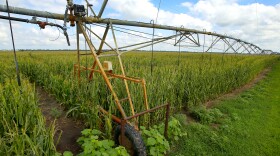-
A team of researchers studied the effects of heat on the survival and reproduction of Missouri treehoppers. "This is more of a story of resilience," says a St. Louis University biology professor.
-
Some of the country's highest home insurance prices are in the central U.S., a region generally considered to be protected from climate-driven disasters such as wildfires and hurricanes.
-
Dr. Imogen Herrick, assistant professor of STEM Education at the University of Kansas, is changing the way climate change is discussed in K-12 classrooms. Her Community Science Data Talks shift the focus from global issues and intangible statistics to local impacts and student emotions.
-
Several states, including Missouri, Illinois and Indiana, are in moderate to severe drought. Climatologists say it’s unlikely to let up soon.
-
Leaves typically start to peak in the Kansas City region by early October, but projecting peak foliage isn't an exact science. Here are some things you can do to get the most out of fall's colors.
-
One great place to put a native plant bed is the base of a tree. It creates what is called a 'soft landing' for caterpillars that need to transition from the tree to pupating on the ground.
-
The Moody Hills neighborhood, once shaded with towering trees, is now lined with stump after stump. It’s part of a street reconstruction project that will also completely overhaul other infrastructure in the northern Overland Park neighborhood.
-
Scientists in the Midwest and Great Plains were poised to start research to cut U.S. reliance on fertilizer imports, keep biofuel farming cost-competitive and tackle a potent greenhouse gas.
-
All six U.S. regional climate centers will remain online through a new contract deadline in mid-June. Four of the centers, which are overseen by the National Oceanic and Atmospheric Administration, were abruptly closed last week after their funding ran out.
-
The closure of four of the six Regional Climate Centers across the U.S. occurred after funding from the National Oceanic and Atmospheric Administration ran out. A recent report stated that the Trump administration plans to propose a 25% cut to NOAA's budget next fiscal year.
-
Many of these programs offered incentive payments to farmers who adopt an environmentally sustainable or “climate-smart” practice. Some partnerships will be renewed and folded into a new program.
-
The tension over water for Quivira National Wildlife Refuge has lasted for decades. But recently, water users made progress toward using less groundwater in the area that impacts Quivira.
Play Live Radio
Next Up:
0:00
0:00
Available On Air Stations












